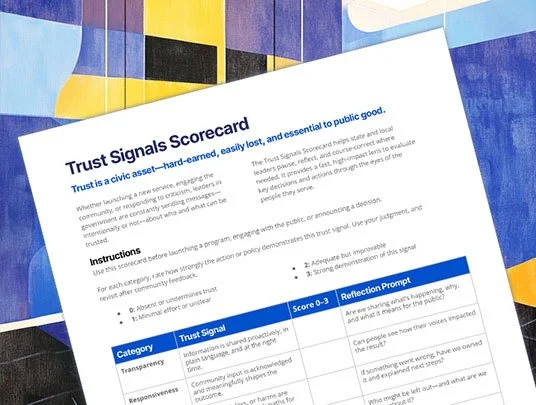Trust Signals Scorecard
The trust gap is real, and widening.
A glimpse at the interactive Trust Signals Scorecard—a practical tool for evaluating how government or public-facing actions earn, risk, or reinforce public trust.
Across the country, people are losing faith in public institutions. State and local government leaders are increasingly asked to do more with less—less funding, less time, less public patience. At the same time, communities are rightly demanding more transparency, accountability, and care.
That tension is more than operational. It’s relational.
Trust in government isn’t just a feeling—it’s the foundation for legitimacy, adoption, and long-term success.
Trust isn’t just about outcomes. It’s about signals.
Most civic leaders don’t set out to erode trust. But it happens.
Sometimes it’s rushed rollout plans. Other times, it’s well-meaning programs that feel opaque or inconsistent to the public. Even small design decisions—word choices, timelines, visuals, and who gets invited in—can send powerful messages about whose experience matters and what people can expect from public institutions.
That’s why we created the Trust Signals Scorecard.
Free resource: Interactive Trust Signals Scorecard
Evaluate your next program, policy, or announcement before it goes live.
We designed this quick, practical tool to help public leaders ask the right questions before launch. It’s grounded in real-world government and civic design experience. It’s shaped by Public Servants’ work across agencies, communities, and sectors.
You’ll be able to quickly assess:
Are we communicating with clarity and care?
Does the public see how their input shaped the outcome?
Are we reinforcing dignity and accessibility?
Have we named who holds power and how decisions are made?
It takes under 10 minutes to use and can prevent months of public confusion or erosion of goodwill.
Why this matters now
Civic trust isn’t built with slogans. It’s built through experience.
People trust public institutions when:
Communications are consistent, not reactive
They feel seen and respected, not managed
Decision-making processes are legible and just
Accountability is visible and sincere
The scorecard doesn’t replace deeper engagement, but it helps ensure your team isn’t unintentionally undermining the very trust you hope to build. It’s a small step toward a bigger goal: government that works—and feels like it works—for everyone.
Designed for real-world constraints
The Trust Signals Scorecard is:
Actionable: takes less than 10 minutes to complete
Adaptable: use it alone or in team meetings
Human-centered: designed with public impact, not perfection, in mind
Grounded: built from Public Servants’ lived experience inside and alongside government
Whether you're leading a policy rollout, preparing for a public meeting, or responding to tough questions—this tool helps you build trust into the process, not just the messaging.
Investing in public trust is a design decision
The best civic work doesn’t just solve problems. It builds confidence that government can serve, adapt, and deliver with integrity. We believe trust is earned—over time, in relationship, and through every decision, big and small.
This scorecard is one way to start.
Licensing
This work by Public Servants LLC is licensed under a Creative Commons Attribution-NonCommercial 4.0 International License.
This license allows those reusing it to distribute, remix, adapt, and build upon the material in any medium or format for noncommercial purposes only, and only so long as attribution is given to the creator.
Have thoughts or want help applying this?
We’d love to hear how you’re using the tool—or talk about trust-building in your current work. Reach out →
Want to learn more about why trust is to important to monitor and earn?
Read our related blog post on earning trust in public service.

